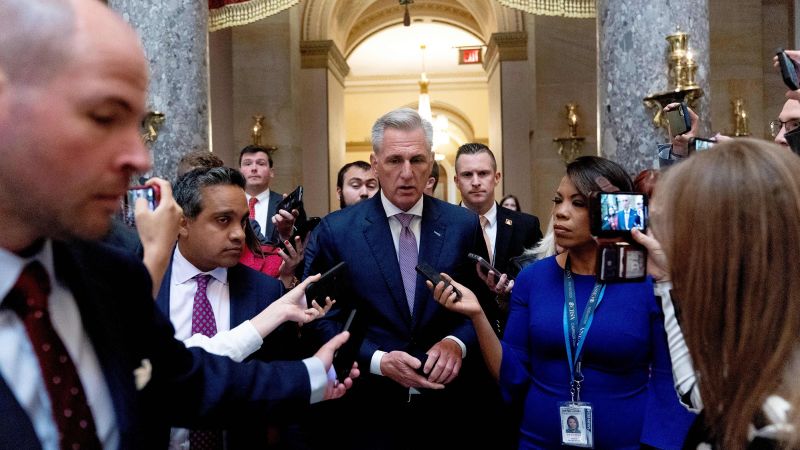

CNN
—
House Speaker Kevin McCarthy has unveiled his plan to address the nation’s looming debt ceiling drama, offering to raise the borrowing cap by $1.5 trillion to prevent a default.
But the proposal comes with a long list of demands from House Republicans that Senate Democrats and the White House strongly oppose. So there’s virtually no chance this bill becomes law, even though McCarthy is pushing for the House to pass it by next week.
Still, it serves as the next move in the drawn-out saga of dealing with the debt limit, which the US hit in January. The Treasury Department is temporarily using cash on hand and “extraordinary measures” to pay the federal government’s bills on time and in full until Congress grants it the authority to resume borrowing beyond the current $31.4 trillion limit. Once those are exhausted, the US would start to default on its obligations, which would unleash economic upheaval globally.
The legislation would save $4.5 trillion over a decade, according to McCarthy, though official cost estimates have not yet been released.
Here’s what House Republicans want in exchange for raising the debt ceiling:
The proposal would return funding for federal agencies to fiscal 2022 levels, while aiming to limit the growth in spending to 1% per year. The Pentagon budget would be spared any reduction.
The package does not list any specific cuts. However, House Appropriations Committee Ranking Member Rosa DeLauro, a Democrat from Connecticut, asked government agencies earlier this year about the potential impact of reducing fiscal 2024 discretionary, non-defense spending (with the exception of veterans’ medical care) to fiscal 2022 levels.
Examples the agencies gave included shutting down 125 air traffic control towers, slashing nutrition services for 1 million senior citizens and eliminating affordable housing assistance for close to 1.1 million families.
Also, the reduction would impact the 6.6 million students who rely on Pell Grants and the 1.2 million women, infants and children who receive nutrition assistance through WIC, DeLauro said. Plus, 200,000 children would lose access to Head Start and 100,000 children would lose access to child care.
The bill would block President Joe Biden’s student loan forgiveness program, which promises up to $20,000 in debt relief for low- and middle-income borrowers, from taking effect. The program is currently tied up in the courts.
The one-time student loan forgiveness program could provide significant financial relief to millions of people. But critics argue that the program would shift the cost of those loans to taxpayers who didn’t go to college or already paid of their student debt.
The proposal would also block a new income-driven repayment plan, parts of which are set to take effect later this year. The repayment plan would benefit both current and future qualifying student loan borrowers by lowering the monthly cost and total amount repaid.
McCarthy’s bill goes further, aiming to prevent the secretary of education from implementing future student debt relief programs that would result in a significant cost to the government.
McCarthy’s plan would rescind the $80 billion set to go to the IRS over the next decade.
Republicans have made the funding a political target. But rescinding the money would actually increase the deficit by $114 billion through 2032, according to the nonpartisan Congressional Budget Office.
The $80 billion was included in the sweeping climate, taxes and health care law, known as the Inflation Reduction Act, that Democrats passed in a party-line vote last year. The infusion is meant to support the troubled IRS crack down on tax cheats and provide better service to taxpayers. As a result, the efforts are expected to increase tax revenue for Uncle Sam.
So far, the money has allowed the agency to hire more than 5,000 customer service agents. As a result, IRS employees have been able to answer 87% of calls from filers with questions this year. They answered fewer than 15% last year.
The bill would fulfill Republicans’ longstanding goal of beefing up work requirements in food stamps and adding them to Medicaid.
Under the plan, childless, able-bodied adults ages 18 to 55 would be able to get food stamps only for three months out of every three years unless they are employed at least 20 hours a week or meet other criteria. Currently, that mandate applies to those ages 18 to 49, though it has been suspended during the Covid-19 public health emergency, which expires on May 11.
It would also require certain adult Medicaid recipients to work, perform community service or participate in an employment program for at least 80 hours a month or earn a certain minimum monthly income. It would apply to those ages 19 to 55, but not those who are pregnant, parents of dependent children, physically or mentally unfit for employment or enrolled in education or in substance abuse programs, among others.
The bill would also make changes to the work requirement provisions of the Temporary Assistance for Needy Families program, which was created out of the 1996 welfare reform package.
All in all, the measures would lead to fewer people receiving aid from these safety net programs, which would save the federal government money.
The debt limit proposal contains two energy provisions likely to be unpopular with Democrats – a repeal of the clean energy tax credits that made up a significant chunk of last year’s Inflation Reduction Act, plus House Republicans’ energy permitting bill, the “Lower Energy Costs Act.”
Repealing the clean energy tax credits in a signed law that is in the middle of being implemented will be a nonstarter for Democrats. And despite Republicans believing it is good messaging to gut clean energy subsidies, it could be politically tricky for the GOP as well. Many benefits from the IRA have gone to red states, where there is a boom in clean energy and electric vehicle manufacturing happening in states including Georgia, Tennessee and South Carolina.
There could be more movement on permitting. The move to slide the Republican permitting bill into the debt limit proposal is a sign the GOP is ready to start negotiating, but its opening bid on permitting contains several provisions some Democrats don’t like, including clawing back parts of the landmark National Environmental Policy Act and prioritizing fossil fuel energy production. Still, Democrats have an incentive to strike a deal on energy permitting to spur more buildout of electrical transmission and clean energy projects, and one major clean energy trade association came out in support of Republicans permitting proposals.
The bill also seeks to rescind unobligated funds from the Covid-19 relief packages that Congress passed to respond to the pandemic.
Estimates on how much of the roughly $4.5 trillion in relief remains vary, with federal agencies pegging it at between $90 billion and $120 billion. The unobligated funds include money to shore up financially troubled multiemployer union pension funds, transit infrastructure grants that have already been allocated and support for veterans’ medical care that will be used by the end of the fiscal year.
